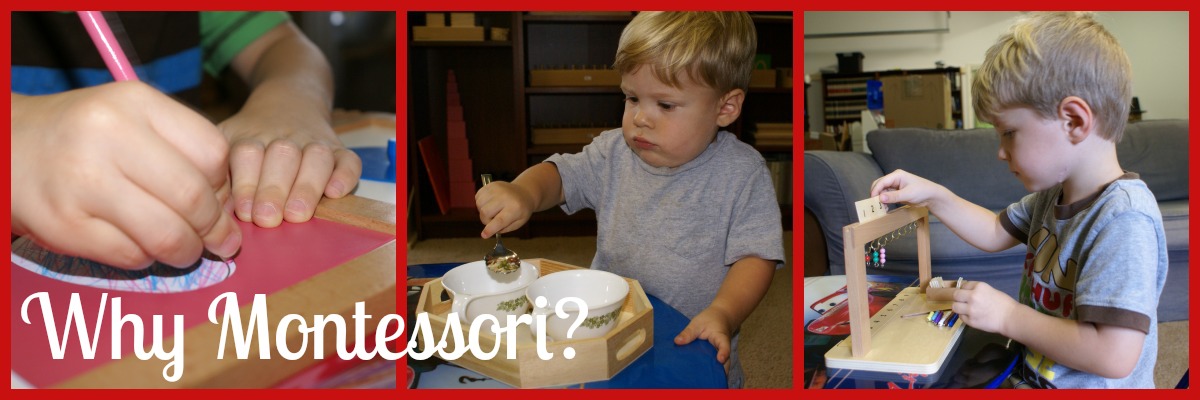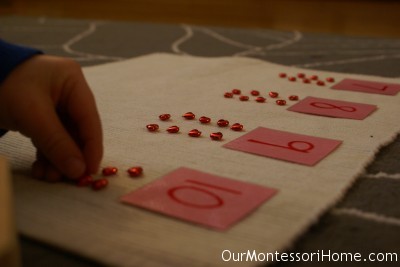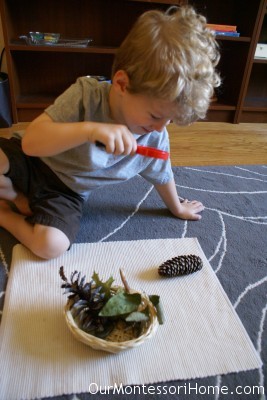Some people may wonder out of all the educational philosophies, why did our family choose to pursue the Montessori method? After being in a Montessori environment (at school and home) and studying the method for nearly 7 years, I still have a hard time articulating our reasons. I tend to stumble over my words and end up saying something like, “You just have to see it” or “It just makes sense.”
I think you really do have to see the Montessori method in action to see the benefit. There are so many facets and real-life benefits outside the classroom that are hard to explain in 1 to 2 sentences. But, if I had to explain why a 100+ year old philosophy is still current and works even amid changing culture, this is what I’d say.
1. Montessori moves from concrete to abstract.
The first thing I noticed and appreciated about the Montessori environment was how all the materials and subject matter moved from the concrete to the abstract. The child is able to interact with concepts and ideas rather than simply memorize facts.
The child quantifies a number in math, understands place value by having a visual representation of ones, tens, hundreds, and thousands
, develops their senses by tactile experiences with rough and smooth boards, sound cylinders, color boxes, and learns land and water forms
by pouring water into miniature land and water formations. I could go on and on.
2. Montessori facilitates a natural love for learning.
I’ve heard some say Montessori is too strict and others say it’s too free. The truth is really somewhere in between. I love the idea of following the child, it’s hard to adjust to from our society that demands the child adapt to the adult’s pace, but once you begin you really do see how much more the child sees, enjoys, and discovers about the world.
The Montessori materials naturally bring about the inquisitive nature of the child and allows them to think of new ways to do things. They open up the child to learn for the themselves. It teaches them how to discover, but doesn’t give a step-by-step direction.
3. Montessori seeks to educate the whole child.
Montessori takes the child’s education outside the classroom. It affects how they interact with others, the freedoms they have in the home, teaches them to care for their self, their environment, and others, and teaches them how to be an active participant in their learning and environment.
Montessori equips the child for everyday life, giving them practical skills which gives them purpose and enables them to be a contributing member of their family, classroom, and community. Montessori sees the child not just as a miniature person, but as a able-bodied and capable person.
4. Montessori abstains from rewards.
There are no gold stars in a Montessori environment. No grades. No “Look how smart you are!” No reward for learning other than the intrinsic joy the child receives when they discover something new or realize they’ve acquired a new skill. (When Montessori does praise, it’s very specific. For example, “I like how diligently you’re working on your penmanship.”)
One of the defects of our education system which has, in turn, affected our society is the idea we need to have a reward for every accomplishment. Whether a child being toilet trained receives candy for eliminating in an appropriate way, or if a child hasn’t thrown a fit they can have dessert, etc.
It all conditions the child to perform for a reward. The child then expects a handout when they do well or what is expected from them rather than doing well for the joy of learning or behaving appropriately because they realize it’s what a contributing, helpful member of society does.
When we offer rewards we are training them to perform for the reward rather than the intrinsic value of learning, possessing a skill, or contributing to their community (family, class, etc).
5. Montessori focuses on the individual child and their potential.
The biggest problem I see with traditional schooling is having a set curriculum based on the child’s age and expecting all children to study and progress through that material at the same pace and each attain optimal results. It just doesn’t happen. It won’t happen.
Why? Because no two children are at the same spot in their development.
Just think of the student who is bored in a subject matter, because he or she already understands the concepts and the work is too easy for them. While on the other hand, another student may seriously struggle with the same concept. The problem comes with the bored child getting in trouble and losing interest in learning and having to wait for his or her peers to catch up, while the struggling child feels less than or embarrassed that they are “failing.”
In a Montessori environment, both students can meet their full potential and work at their own pace. They don’t have to wait for other students to catch up or feel like a failure for not understanding fractions. Each child learns differently and at a different pace, that’s why Montessori’s recognition of sensitive periods in the child and the teacher’s daily observation are so important.
While some may say this causes more work for the teacher, in a Montessori environment it doesn’t. The scope and sequence of each subject area (math, language, practical life, sensorial, culture/geography, botany, zoology, etc) is the same for each student. The materials are already prepared and present on the shelf. All the teacher has to do is be aware of where the student is and be ready to give the next lesson in the sequence.
***
These are just a few of the reasons why my husband and I love the Montessori method. As I was writing this post I found myself going on and on, but stopped short for brevity’s sake.
I’d love to hear,
Why do you love Montessori?
*Disclosure: This post contains affiliate links. If a purchase is made from the link, Our Montessori Home would receive a percentage.




































10 comments… add one
I LOVE Montessori…for all the reasons you mention. I worked outside the home when our oldest child (who is now 6) was in preschool…and he went to a fabulous Montessori program. He went to public Kindergarten last year and it was a tough year for him, given the way he was accustomed to learning. So, I’m now staying at home with him and our younger (2 year old) son…and trying to make our learning experiences Montessori-esque. I know that home is a natural place for Montessori learning…however, I’m having an awful time feeling like (even though I know it’s not really the case) I need to have all the wonderful “official” Montessori supplies at my disposal. Also, wanting to be sure that I cover necessary concepts for a first grader sort of clashes with how I know child-lead learning should go. (i hope this is making sense!) I actually did my college coursework in child development…but it is – for me – always easier to do these things for someone else’s child rather than my own. 🙂
Anyway, as a result, I’m feeling frustrated and sort of at a loss…yet hopeful that I can get into a good swing of things with both my kiddos learning in an appropriate way! Thanks for your post…it was very encouraging to me tonight! 🙂
Melissa,
I’m glad you could be encouraged! I’ve definitely been there with having the materials. There’s a lot of great DIY posts from Montessori homeschool bloggers. Deb (from http://www.livingmontessorinow.com) is great at rounding up these type of tutorials. I’m sure you’ll find the balance you need as time goes on. Best to you.
well said! that is why I love teaching with the Montessori method! 🙂
Beautiful! I’m in the middle of my AMS training, and you’ve managed to articulate my feelings of the Montessori method thus far. I love it!
Thanks, Shaila. I’d loved to hear how you’re enjoying your training and what you’re learning. One of my regrets is not doing the AMS training when I lived in the same town as a training center. Now, the closest one is 2 hours away and not so practical anymore.
It’s very good post, I’m reminded again why I’m interested in Montessori. May I know how old was Otto when he did transferring with spoon ?
I have a 26months old son, but every time I tried the transferring, he pour them all into the other basket, then on the floor & spread them all around. He is still doing it now. What do you think ? Thanks.
Susan –
Otto’s about 20 months. But I really think it depends on the child, because Joey (who’s now 3.5) has never really been interested in spooning. He’ll do it occasionally, but has never had the same interest Otto does. He use to do just what you’re son is doing and still finds the whole process tedious. You could try transferring objects by hand or instead of spooning using tongs. Joey actually likes tonging work.
Hi there!
Great job to do Montessori at home! I’m glad I’m not the only one who is looking for words when one asks about the benefits of the Montessori method… All I can say is, ‘it’s good for the children! You can see it!’
I’m currently launching a parent child Montessori workshop in my are.
All the best to you!
Beatrice
Great Article! completely agree with you that Montessori teaching method is the best method for young developing minds and I concur with all the points that you provided above for Montessori way of learning to children. Thank you.
Thanks for sharing this post I am excited about Montessori schools. You have shared great information and I like your thoughts they very useful for us.